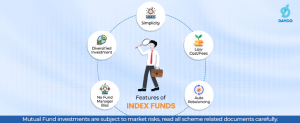Unlocking the Potential Exploring the Workings and Benefits of Index Funds
![]() July 8, 2024
July 8, 2024
![]() 0 Comments
0 Comments
Whether you're a seasoned investor or just beginning your journey, understanding how index funds operate and the advantages they offer is crucial for making informed decisions that can propel your financial growth. In this comprehensive guide, we will delve into the mechanics of index funds, demystify their complexities, and shed light on the remarkable benefits they provide to investors of all backgrounds.
An investor should always choose his investment according to his Risk Profile and Goal. For short-term goals, you may go for Debt schemes, but for long-term goals, where your time horizons are at least 5 years, you have to go for Equity Schemes. Regarding Equity-based schemes, you have to choose between an Actively Managed Fund and a Passive Fund. Index Funds are ideal for new investors as well as for seasoned investors who want to take exposure to the broad market benchmark at a low cost.
Let’s Start From The Basic - What Is an Index?
An index is a basket of stocks that are related in one way or the other. For example, NSE has set some criteria regarding which stocks should be in the Nifty 50 “basket” of stocks. Some of these criteria include - inclusion of stocks in the F&O segment, free float market cap of the stock should be 1.5 times that of the smallest constituent stock currently in the Nifty 50 index, and other such criteria.
Similarly BSE has a basket of large cap stocks. They call this basket or index Sensex.
There are many other indexes benchmarked by BSE and NSE. There is an index that contains Midcap stocks, an index that contains Microcap stocks. Apart from market capitalisation based indices, there are sectoral indices as well - like the Nifty IT index.
An index mutual fund, replicates the stocks that are there in the basket of the index that the mutual fund focuses on.
| Note |
| In the media, and over the internet, when people talk about index funds, they generally mean funds that replicate market cap based indexes (like Nifty 50, or Nifty Midcap 100). Technically, speaking, an index fund can also replicate sectoral indexes. But in that case, we generally don’t call them index funds, rather we call them sectoral or thematic funds. |
Actively Managed Fund Vs Passively Managed Fund - The Basic Idea Behind Index Funds
Unlike Active investing, which aims to beat the benchmark index by churning the portfolios by the fund managers who are responsible for identifying opportunities in the market, the portfolio of the passive funds gets rebalanced only on the changes in the underlying index.
It has been observed that most of the Actively managed Mutual Fund schemes don’t beat the market or index fund over the long-term periods. Though some of the funds may outperform the index over a 5 -7 years period, they are less likely to continue that outperformance. In the case of an Index Fund, the Fund Manager does not actively select Industries and stocks to build the funds’ Portfolio. He simply invests in all the stocks of the identified Index to be followed. The weightage of the stocks in the fund closely matches the weightage of each of the stocks in the said Index.
Say X stock has a weightage of 5% in an Index. An Index Fund based on that particular Index would also allocate 5% of its portfolio to X stock. If the weightage of the X stock changes from 5% to 6%or vice versa, the fund manager must buy or sell X stock to align the Portfolio with the Index.
A fund manager can offer you an extra return over the benchmark in the case of an Actively managed fund. But, it may not be possible for a fund manager to beat the benchmark consistently over a long period. Whereas a Passive Fund or Index Fund can offer you a tension-free benchmark return. Passive investing is an investment strategy that aims to track the broad market index closely and make a replica of an existing index, like the Nifty50 or the Sensex, by copying its constituents and investing in them in an identical proportion with an aim to offer commensurate returns.
Lookout For The Tracking Error In Passively Managed Index Funds
Though, in the case of an Index Fund, the fund manager is only making a replica of the said Index, the fund does not always generate the same returns in the line of the said Index due to Tracking Errors. During a particular period, your Index Fund has delivered a 7% return, whereas the Index which your Fund is following has generated an 8% return. This difference of 1% is the Tracking Difference that has occurred due to Tracking Error.
Tracking Error is the difference between an investment portfolio’s returns and the index it mirrors. It is not always easy to hold the securities of the index in the same proportion due to expenses towards the cost of buying and selling stocks and the inability to buy or sell the underlying stocks due to low liquidity levels or sudden market movements. Always the investor should go for Index Fund whose Tracking Error is comparatively low from its peers.
Benefits of Investing in Index Funds
- Simplicity – One of the key benefits of investing in index funds is their simplicity. Unlike actively managed funds that require in-depth research and decision-making, investing in index funds is straightforward. All you need to do is select an index that aligns with your investment goals, such as the Nifty50 or the Sensex, and choose an index fund that tracks that specific index. By eliminating the need for constant monitoring and analysis, index funds provide a hassle-free investment approach suitable for both beginners and experienced investors.
- Low-Cost Investment – Index funds offer a compelling advantage in terms of cost-effectiveness. These funds typically have significantly lower expense ratios compared to actively managed mutual funds. An expense ratio represents the annual fee charged by the fund to cover operating expenses, management fees, and other associated costs. Due to their passive nature, index funds require minimal management and research efforts, resulting in lower expenses. This cost efficiency translates into more favorable returns for investors, as a smaller portion of your investment is eroded by fees, enabling you to keep more of your earnings over the long term.
- Auto Rebalancing – Another noteworthy advantage of investing in index funds is the automatic rebalancing feature. Rebalancing refers to the process of adjusting the portfolio's asset allocation to maintain the desired balance of investments. With index funds, rebalancing occurs only when there are changes in the underlying index. For example, if a particular stock within the index experiences a significant increase or decrease in value, the index fund automatically adjusts its holdings to reflect those changes. This automated mechanism ensures that the fund remains aligned with the index's composition, allowing you to benefit passively from the overall performance of the market without needing to manage your investment actively.
- No Fund Manager Bias - Since the percentage of the constituent stocks get readjusted automatically, the fate of an index fund isn’t tied to the decisions of a fund manager. It is not the fund manager who decides which fund should be there in the index fund. It is the criteria set forth by the exchanges that influences the inclusion of stocks in index funds.
- Diversification – Diversification is a crucial strategy to manage investment risk effectively, and index funds excel in this area. By investing in an index fund, you gain exposure to a wide range of stocks within the index it tracks. For instance, a NIFTY50 index fund would include a diversified portfolio of 50 large-cap Indian companies. This diversification across multiple stocks helps reduce the impact of any individual stock's performance on your investment.
Remember: It’s Your Patience That Will Decide How Successful an Index Fund Is
If held on to for a long time, index funds can give returns well over 15%. But the keyword, here, is - “Long Time”. Several AMC - both domestic and international - have reported time and again that despite their index funds giving impressive returns, an alarmingly few people have actually leveraged the ROI. And the main reason is the investor’s lack of patience. A large number of investors fail to hold on to an index fund for 15, 20 years. This phenomenon is known as the behaviour gap - the act of buying and selling at the wrong time after getting influenced by emotion. So if you want your index fund to be successful, HOLD.
If you have a question, share it in the comments below or DM us or call us – +91 9051052222. We’ll be happy to answer it.
~Suman Dan
Share With
I'm a cool paragraph that lives inside of an even cooler modal. Wins!
Are you sure?
In case you didnt know, you can open your account online within 24 hours. Offline account opening takes up to 4 working days. If you wish to open your account offline, fill and sign the forms using a black/blue ballpoint pen. Please fill in the email and mobile number of the applicant to avoid account opening delays.
Enter Password
Please enter your details and password
New to Dayco?
Enter Password
Please enter your details and password
New to Dayco?
Filing Complaints on SCORES (SEBI) – Easy & Quick
- Register on SCORES Portal (SEBI)
- Mandatory details for filing complaints on SCORES:
- Name, PAN, Address, Mobile Number, E-mail ID
- Benifits:
- Effective Communication
- Speedy redressal of the grievances
Thanks !!
Your details were successfully received.

Thank you for Your Feedback!
Our Team is working constantly on improving our user experience and your feedback really means a lot.
Thanks !!
App Link Send to your mobile number successfully.
Thank You
All your Questions have been recorded
Thank You
All your Questions have been recorded
Thank You!
Thank you for your response. We'll get in touch with you at the earlisest for your investment planning needs
NEXT
Thank You!
Thank You for your interest in our Moderate Equity Portfolio. Please find below the credentials to track this portfolio:
User ID: mockmod@daycoindia.com
Password: abcd@1234
Portfolio Tracker
Please Read!
Risk profiling is crucial for identifying and managing potential risks in investment decisions. Please carry out your risk profiling before making any investment decisions.
Complete Risk Assessment Now
Thank You !!
Please enter your details to download/print the report
Thank You !!
Please enter your details to download/print the report
Thank You !!
Please enter your details to download/print the report
Thank You !!
Please enter your details to download/print the report
Thank You !!
Please enter your details to download/print the report
Set Your Goal
Please Select an option from below
Set Your Goal
Please Select an option from below
Thanks You !
We appreciate your interest in our services. Our team will be in touch with you shortly.
CloseSet your Goal
Please enter your details in the fields provided
Thanks You!!
Calculation report has been sent to your mail id successfully
Clear form?
This will remove your answers from all questions and cannot be undone.



 Book Appointment
Book Appointment









Leave a Reply